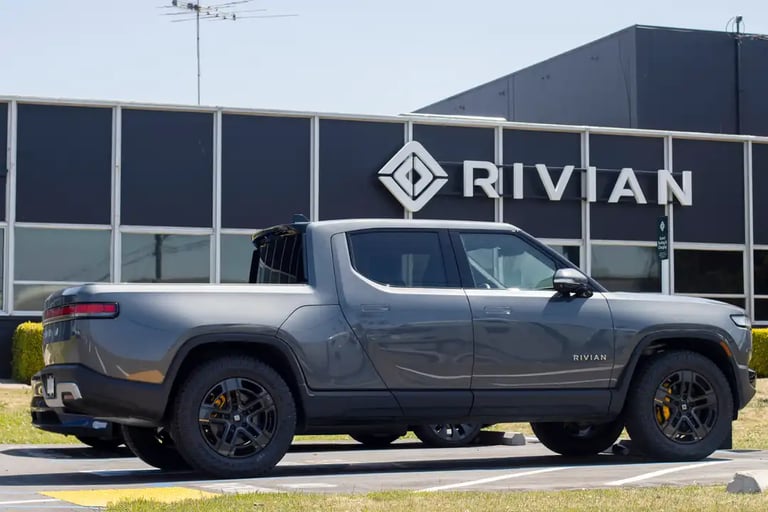Rivian Caution! 2023-09
Rivian's stock has taken a nosedive, plummeting by a staggering 81% from its glorious peak. And if that wasn't enough, brace yourself for more potential downward spiral as the company recently engaged in a bond sale that could dilute its stock value even further. To add fuel to the fire, Rivian's quarterly financial report is far from rosy, with eye-watering losses amounting to a whopping $1.2 billion. As if that weren't concerning enough, the Wall Street Journal dropped a bombshell, revealing that Rivian is hemorrhaging a jaw-dropping $33,000 for every electric vehicle it sells. The state of the US stock market is a cause for alarm, with many experts highlighting its overvaluation. In such a precarious environment, it's the high-growth stocks like Rivian that are particularly vulnerable. Should the market take a nosedive, Rivian's profitability, or lack thereof, could face a severe beating.
9/18/20233 min read

Nixfrontier Analysis: A Cautionary Perspective on Rivian's Future
As a financial analyst at Nixfrontier, I have reservations about investing in Rivian (NASDAQ: RIVN) due to the significant downside risk associated with its current price levels. The stock has already experienced a substantial decline of over 81% from its all-time highs, and recent events, such as the dilutive bond sale, suggest that further declines may be on the horizon.
While the bond sale does provide Rivian with additional liquidity, it is essential to consider the context in which this decision was made. The company has been grappling with staggering quarterly losses, with a reported $1.2 billion loss in Q2 2023 and no clear path to profitability in sight.
Undoubtedly, Rivian has outperformed some of its EV counterparts, including Lucid, Fisker, and Nio, in terms of year-to-date stock price performance. However, it still lags behind Tesla, the industry leader. The Wall Street Journal reports that Rivian currently incurs a loss of $33,000 per electric vehicle (EV) sold. To achieve profitability, Rivian plans to scale up production and deliver more EVs—an ambitious goal that comes with its own set of challenges.
Examining Rivian's Q2 2023 results reveals a company that is far from achieving profitability. While the production numbers appear encouraging, with 12,640 EVs delivered (a 183% year-over-year increase), the massive losses of over $1 billion raise concerns. Although a preliminary report indicates 15,564 deliveries in Q3 2023, Rivian has yet to release its earnings report for that period.
Management has made promises of cost-cutting measures and reducing employee headcount to achieve positive gross profit by 2024. However, it is crucial to note that negative free cash flow increased from $1.563 billion in Q2 2022 to $1.616 billion in Q2 2023. This rise in negative free cash flow puts pressure on the company to take on debt or dilute shareholders, both of which have occurred through convertible bond sales, including a $1.3 billion offering in March and a recent $1.5 billion offering in October 2023.
Looking ahead, it is important to consider the potential risks associated with investing in Rivian. Share dilution remains a persistent concern, as the company continues to scale rapidly and seeks funding for production through additional convertible bond sales. Moreover, the possibility of higher interest rates poses a challenge, as increased borrowing costs may impact consumer spending on EVs. Rivian's CEO, RJ Scaringe, aims to achieve profitability by cutting $40,000 from the cost of each EV. However, this raises questions about potential compromises in quality, as reducing costs significantly while maintaining high standards may prove challenging.
Another risk factor is the potential for price cuts, as witnessed with Tesla and Lucid, who adjusted their EV prices to boost demand in an inflationary environment. Should Rivian be forced to follow suit, it could further impact RIVN shares. Additionally, RIVN shares are currently trading just above the 200-day moving average of $18.21, and breaching this key technical support level may lead to further downside.
While there is always the possibility of Rivian turning things around and achieving profitability, it is essential to remain cautious. The company could potentially reduce costs by modifying its initial EV concept and taking advantage of falling lithium prices. Furthermore, the early settlement of convertible bonds before the maturity date in 2030 could provide additional funding for Rivian's SUV and its proposed $5 billion production plant in Georgia. If Rivian performs well, convertible bond holders may prefer common shares over bond repayments. However, it is worth noting that a lower RIVN share price would reduce this potential risk and offer a more favorable "margin of safety."
As of now, I am personally avoiding investing in Rivian stock. The initial hype around the Rivian IPO did not convince me, and I believe it is prudent to wait for RIVN shares to trade at significantly lower levels. There is no urgency to succumb to the fear of missing out (FOMO) when the company may require further dilution to sustain its operations.
Examining the RIVN weekly relative strength index (RSI) chart, it is evident that the stock has been on a slow but steady decline since the spike in July 2023. Given this trend, there seems to be little reason to catch a falling knife at this time. It is worth closely monitoring whether RIVN shares dip below the crucial 200-day moving average support level of $18.21.
When Ford sold its majority stake in Rivian, it should have prompted prospective investors to analyze Rivian's business model more critically in the short term. Rather than focusing on rapid growth, Rivian should prioritize quality to ensure long-term customer satisfaction. Moving too quickly toward a destination can result in losing control and failing to reach thePlease note that the above analysis is a cautionary perspective on Rivian's future and should not be considered as financial advice. It is always recommended to conduct thorough research and consult with a qualified financial advisor before making any investment decisions.




